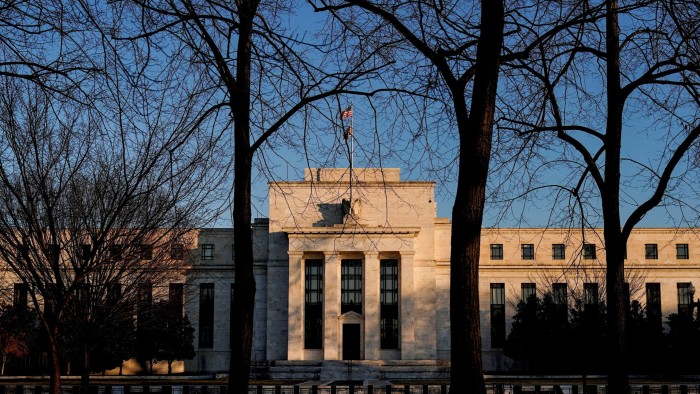Unlock the White House Watch newsletter for free
Your guide to what the 2024 US election means for Washington and the world
The writer is an assistant professor at Brown University and the author of the forthcoming book ‘Bankers’ Trust’ on central bank co-operation in crises
The erosion of trust in the US among its traditional partners is growing as turmoil in normally stable policy areas such as trade and security deepens.
As the Trump administration pulls back from its long-term global commitments, concern is growing about how seriously it now takes the responsibilities that come with being the monetary hegemon in times of crisis.
Last month, some unnamed European central banking and supervisory officials told Reuters that they were questioning whether they can still rely on the US Federal Reserve support during times of market stress. The worry is that the Fed might face political pressure to suspend the so-called swap lines that provide dollar liquidity to foreign central banks in such moments.
Time and time again in the past, the Fed’s swap lines have maintained global financial stability, pumping dollar liquidity into the system in crises. The underlying implicit contract is a quid pro quo — as long as the dollar is king, and the US benefits from everyone borrowing, lending and saving in dollars, the Fed should play this role. Yet this contract has never been as certain as many assume.
First, the Fed’s ability to act in this way relies on the staff at the central bank being willing to act in this way. Given Trump’s long-standing suspicion of multilateralism and desire to put America first, one should no longer assume that assurance is in place.
The president has said he does not intend to replace Jay Powell as chair of the Fed before his term ends in 2026. The Fed under Powell has continued his predecessors’ policy of keeping standing swap lines in place. But the next Trump appointee for Fed chair may chose not to. Thus, risks to the Fed’s willingness to carry out its global responsibilities under a differently constituted Federal Open Market Committee could manifest as soon as next year.
Second, the Fed’s ability to act relies on a grant from Congress from 1914 that authorises such actions. Congress grants the Fed its authority, and it can take it away. The Fed’s five current standing swap lines with central banks in Europe, Japan and Canada are not as long-standing as many believe; they are reconstituted annually. And Congress appears increasingly unwilling to deviate from Trump’s wishes.
There has long been concern in Congress that crisis support amounts to “bailing out foreigners”. The Fed’s swap programme during the financial crisis stoked bipartisan calls for greater accountability. Then-Republican Senator Richard Shelby criticised the Fed for failing to “stay within the limits envisioned by Congress” during the crisis.
In 2009, then-Democratic congressman Alan Grayson questioned former Fed chair Ben Bernanke about a swap line to New Zealand in the previous year. ‘‘Seriously, wouldn’t it have been better to extend that kind of credit to Americans rather than New Zealanders?’’ he asked.
But the currency swap lines are not foreign bailouts. Foreign central banks can access dollars that they cannot print themselves, in exchange for their currencies. The swap lines in the financial crisis peaked at an outstanding amount of $583bn in December 2008. As Bernanke wrote in his memoir of the crisis, these lines proved “crucial in containing global contagion”.
Still only a few years later, use of the swap lines during the Eurozone crisis drew fresh criticism, once again inciting bipartisan calls to investigate the Fed. The then-congressman Ron Paul, a libertarian, painted these renewed lines as “a thinly-disguised bailout” created “out of thin air to prop up the euro”.
Economic historian Charles Kindleberger taught us that global stability relies of the hegemon’s willingness and ability to lead. His main lesson in The World in Depression, 1929-1939, draws from the devastating implications of the missing hegemon in 1930s — “no longer London, not yet New York” — to keep the global economy to in balance. The need for this “one stabiliser”, today, the Fed, became clear during the financial crisis and the pandemic. In the interim, the global economy has grown reliant on these facilities, as is clear in the concerns expressed by the European officials last month.
If faith in the Fed’s willingness and ability to provide liquidity to those who use dollars outside the US — so, nearly everyone — diminishes, the effects will be felt globally. It is hard to tell how serious the risk of that is but we are in unusual times. And even the fact it is starting to be talked about is a concern.
